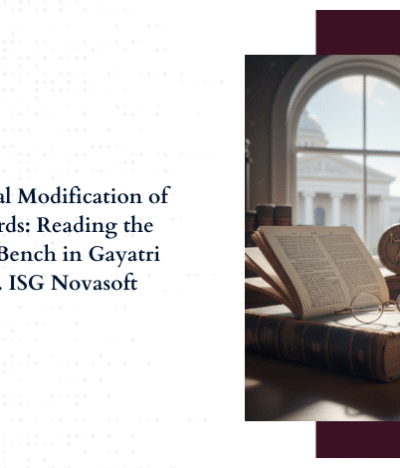On December 13, 2023, the Supreme Court of India delivered a groundbreaking verdict that promises to significantly impact arbitration proceedings across the nation. In the case of In Re: Interplay between Arbitration Agreements under the Arbitration And Conciliation Act, 1996 and the Indian Stamp Act, 1899, a seven-judge bench unanimously addressed the long-standing controversy regarding the admissibility of unstamped or insufficiently stamped arbitration agreements.
Background and Legal Ambiguity
The crux of the controversy addressed by the Supreme Court revolved around whether arbitration agreements, which are not stamped or are insufficiently stamped, can be considered valid and admissible in legal proceedings? The Indian Stamp Act, 1899, mandates that certain documents be stamped to be admissible in court. However, the Arbitration and Conciliation Act, 1996, promotes a broad and facilitative approach towards arbitration, aiming to minimize judicial intervention in arbitration proceedings.
The ambiguity arose from the seeming conflict between these two laws. On one hand, the Stamp Act appeared to invalidate any unstamped contractual document, potentially including arbitration agreements contained within them. On the other, the Arbitration Act embodies a pro-arbitration stance, encouraging the resolution of disputes through arbitration.
Judicial Journey
The journey towards reinforcing the true essence of the Arbitration and Conciliation Act, 1996, in India has been marked by pivotal legal battles, among which the cases of NN Global Mercantile Private Limited v. Indo Unique Flame Limited (“NN Global 1”) and its subsequent review in NN Global 2 stand out. These cases highlight the evolving jurisprudence on arbitration in India and underscore the judiciary’s efforts to align the country’s arbitration regime with international standards, emphasizing the principles of minimal judicial interference and the autonomy of the arbitration process.
NN Global 1
In this landmark case, a three-judge bench of the Supreme Court upheld the doctrine of separability, affirming that the validity of an arbitration agreement is independent of the payment of stamp duty on the substantive contract. This decision was in line with the pro-arbitration ethos envisioned by the Arbitration and Conciliation Act, 1996, which aims to facilitate a swift and efficient dispute resolution process outside the conventional court system. The ruling underscored the principle that arbitration agreements should not be invalidated due to procedural lapses related to the main contract, thereby promoting arbitration as a viable and effective dispute resolution mechanism.
Vidya Drolia v. Durga Trading Corporation
The perspective adopted in NN Global 1 contrasted with the earlier stance taken in Vidya Drolia v. Durga Trading Corporation, leading to a referral to a larger bench for a definitive interpretation of the law. This discrepancy highlighted the need for a clear judicial understanding of the Arbitration Act’s intentions and its interplay with other legal requirements, such as stamp duty compliance.
NN Global 2
The subsequent review by a five-judge bench in NN Global 2 brought to fore concerns regarding the practical implications of enforcing arbitration agreements embedded in unstamped contracts. The decision inadvertently increased the judiciary’s burden, complicating the process for appointing arbitrators and potentially delaying dispute resolution. This approach seemed to divert from the global trend of upholding arbitration agreements’ validity, thereby affecting India’s image as an arbitration-friendly jurisdiction. The enforcement of NN Global 2’s directives led to a stricter scrutiny of arbitration agreements for stamp duty compliance, impacting various commercial agreements and undermining the arbitration process’s efficiency.
Restoration of the Arbitration Act’s Intentions
The Supreme Court’s subsequent judgement, which overruled NN Global 2, marked a significant turning point. By reasserting the separability doctrine and the non-necessity of stamp duty for the validity of arbitration agreements, the Court effectively restored the Arbitration Act’s foundational intention. This pivotal decision reemphasizes the Act’s aim to provide an efficacious and speedy remedy for dispute resolution through arbitration, minimizing judicial intervention in the arbitration process.
Implications and Alignment with International Norms
The restoration of the Arbitration Act’s true intention has several key implications:
Promotion of Arbitration: It reinforces arbitration as a preferred mode of dispute resolution, encouraging parties to opt for arbitration by ensuring that procedural formalities do not unduly hinder the arbitration process.
International Alignment: The judgment aligns India’s arbitration laws with international norms and practices, particularly the widely recognized principle of separability. This alignment enhances India’s attractiveness as a destination for international arbitration, promoting legal certainty and reliability for international parties considering arbitration in India.
Strengthening Pro-Arbitration Regime: By reaffirming the separability doctrine and ensuring minimal judicial interference, the judgment strengthens India’s position as an arbitration-friendly jurisdiction. It signals to the global community India’s commitment to upholding international arbitration standards, thereby fostering a conducive environment for dispute resolution.
The Supreme Court’s Unanimous Decision
The court decisively overruled the previous judgement by a five-judge bench in NN Global Mercantile Private Limited v. Indo Unique Flame Limited, which required courts to consider the stamping of underlying contracts during the initial stages of arbitration proceedings. The apex court’s ruling clarified that unstamped or insufficiently stamped instruments, while initially inadmissible as evidence, do not render the arbitration agreement void or unenforceable. This ruling underscores the court’s commitment to upholding arbitration agreements as independent and enforceable, even in the absence of stamp duty payment. The key points of the ruling can be summarized as follows:
Validity of Unstamped Agreements:
The Court held that an arbitration agreement does not lose its validity merely because it is contained within an unstamped or insufficiently stamped document. This principle affirms the autonomy of the arbitration agreement from the main contract, consistent with the doctrine of separability in arbitration law.
Admissibility in Evidence:
While initially, an unstamped or insufficiently stamped instrument may not be admissible as evidence in court, this condition is not absolute and can be remedied. The Court clarified that such instruments could be regularized by paying the requisite stamp duty, after which they could be admitted as evidence. This approach mitigates the concern that arbitration proceedings could be unduly delayed or obstructed due to issues related to stamp duty.
Overruling Previous Judgments:
By making this ruling, the Supreme Court overruled its previous decisions that mandated the examination of the stamp duty status of documents containing arbitration agreements at the outset of arbitration proceedings. This shift in judicial approach is aimed at ensuring that arbitration proceedings are not stalled at the initial stages due to procedural technicalities related to stamp duty.
Encouraging Arbitration:
The judgment reinforces the pro-arbitration legal framework established by the Arbitration and Conciliation Act, 1996. It emphasizes the importance of upholding arbitration agreements and ensuring that disputes can be resolved through arbitration without unnecessary judicial intervention.
Harmonizing Contradictory Statutes
The judgement harmoniously interpreted the Arbitration and Conciliation Act, 1996, the Indian Stamp Act, 1899, and the Indian Contract Act, 1872. The Supreme Court emphasized that the Arbitration Act, being a specialized law promoting efficient and expeditious dispute resolution through arbitration, should take precedence over general laws like the Stamp Act and the Contract Act. The Court’s interpretation aligns with global arbitration practices, reinforcing India’s stance as an arbitration-friendly jurisdiction.
The Indian Stamp Act, 1889, and Arbitration Agreements
The Indian Stamp Act was enacted to consolidate and amend the laws relating to the stamping of documents. The primary purpose of the Act is to collect revenue for the state through the duty imposed on certain types of documents, which are executed within the country or brought into India. The Act specifies the types of documents that are subject to stamp duty, the rates at which duty is levied, and the penalties for non-compliance.
Stamp duty is essentially a form of tax that is paid to the government for the legal recognition of certain documents. Under the Stamp Act, documents that are not duly stamped are not admissible in court as evidence, except in certain circumstances provided by the Act itself or other related laws.
Arbitration Agreements and the Stamp Act
Arbitration agreements, which are formal agreements between parties to submit present or future disputes to arbitration, are not explicitly mentioned in the Indian Stamp Act as a distinct category of documents requiring stamping. However, they are often part of broader contracts that do require stamping, such as commercial contracts, partnership agreements, or lease agreements. This has led to confusion and legal debate about whether an arbitration agreement, if contained within an unstamped or insufficiently stamped contract, is itself invalid or inadmissible in legal proceedings.
The Supreme Court’s Clarification
The Supreme Court’s decision addressed this inconsistency by affirming that the validity of an arbitration agreement is independent of the stamping of the main contract. The Court emphasized the principle of separability, which holds that the arbitration agreement within a contract is legally distinct and survives even if the main contract is void, unenforceable, or not duly stamped. Consequently, an arbitration agreement can be invoked and can proceed to arbitration even if the document containing the agreement has not been stamped in accordance with the Stamp Act.
The Supreme Court discussed the legislative intent behind the Stamp Act, focusing on Chapter IV’s provisions that mandate the stamping of instruments. The court highlighted Section 35, which renders unstamped or insufficiently stamped instruments inadmissible in evidence, yet emphasized that this does not void the agreements they contain. This distinction underlines the court’s approach to balancing the need for stamp duty compliance with the enforcement of arbitration agreements.
The Arbitration and Conciliation Act, 1996: Autonomy and Judicial Non-interference
The Arbitration and Conciliation Act, 1996, represents a cornerstone in the development of arbitration law in India, embodying a significant shift towards recognizing and promoting arbitration as a preferred mode of dispute resolution. This Act was introduced with the intention of encouraging the resolution of disputes outside the traditional court system, thereby providing a faster, more efficient and cost-effective alternative to litigation.
Autonomy of Arbitral Proceedings
One of the Act’s fundamental principles is the autonomy of the arbitral process. Arbitral autonomy emphasizes the independence of the arbitration process from the jurisdiction of national courts, allowing parties to resolve their disputes privately and without undue interference. This principle is manifest in several provisions of the Act, which enable parties to select their arbitrators, choose the applicable law and decide on the procedure to be followed. The Act respects the agreement of the parties as the bedrock of the arbitration process, underscoring the notion that parties are free to determine the manner in which their disputes are resolved.
Minimal Judicial Interference
Closely related to the concept of arbitral autonomy is the principle of minimal judicial interference. The Act delineates a limited role for courts in the arbitration process, mainly confined to the support and supervision of the arbitration proceedings, rather than intervention. Courts may intervene in specific circumstances, such as in the appointment of arbitrators (section 11) or in the setting aside of an arbitral award (section 34), but such interventions are intended to support, rather than supplant, the arbitration process.
The Separability of Arbitration Agreements
The principle of separability is crucial to the operation of arbitration agreements. It holds that an arbitration agreement is legally independent from the main contract in which it is embedded. This means that the validity of the arbitration agreement does not depend on the validity of the overall contract. An arbitration clause can therefore survive even if the main contract is found to be void, unenforceable or terminated. The Act implicitly endorses this principle, which is vital for ensuring that disputes can still be referred to arbitration even if there are substantive issues with the main contract.
The Doctrine of Kompetenz-Kompetenz
The doctrine of kompetenz-kompetenz (competence-competence) further underscores the autonomy of the arbitral process by allowing arbitral tribunals to determine their own jurisdiction. This means that an arbitral tribunal has the authority to decide on the existence and validity of the arbitration agreement that gives it its authority, as well as on the scope of its own jurisdiction to hear the matters presented. The Act specifically incorporates this principle in section 16, affirming that an arbitral tribunal may rule on its own jurisdiction, including any objections with respect to the existence or validity of the arbitration agreement. This doctrine ensures that arbitration can proceed without unnecessary delays caused by jurisdictional challenges in courts, although the final decision of the tribunal on its jurisdiction can be reviewed by courts at the time of enforcement or setting aside of the award.
Global Context and the Separability Principle
The principle of separability in arbitration is a cornerstone doctrine that has received global recognition and acceptance in both national laws and international conventions governing arbitration. This principle plays a crucial role in ensuring the effectiveness and autonomy of the arbitration process, by treating the arbitration agreement as legally independent from the main contract in which it is embedded.
International Recognition of the Separability Principle
United Kingdom (UK)
In the UK, the principle of separability is explicitly codified in the Arbitration Act 1996, under Section 7. The Act states that an arbitration agreement is to be treated as distinct from the other terms of the contract, and its validity is not affected by the main contract’s fate, whether it is found to be void, voidable, or terminated. This legislative provision ensures that disputes can be submitted to arbitration even if there are allegations regarding the validity of the contract itself.
United States of America (USA)
The USA has similarly embraced the separability principle, particularly through judicial decisions interpreting the Federal Arbitration Act (FAA). In the landmark case of Prima Paint Corp. v. Flood & Conklin Mfg. Co., the U.S. Supreme Court upheld the separability doctrine, ruling that arbitration clauses are “separable” from the contract in which they are a part. This means that arbitration proceedings can go forward to resolve disputes regarding the contract’s validity, independent of court proceedings that address the validity of the contract as a whole.
Singapore
Singapore, known for its pro-arbitration legal framework, also recognizes the separability principle through its International Arbitration Act. The Act adopts the UNCITRAL Model Law, which enshrines the separability doctrine, ensuring that the arbitration agreement is not rendered ineffective by the main contract’s invalidity or termination. Singapore’s arbitration laws and its judiciary’s arbitration-friendly interpretations have made it a leading hub for international arbitration.
Alignment with International Conventions
The New York Convention
The Convention on the Recognition and Enforcement of Foreign Arbitral Awards, commonly known as the New York Convention, is a pivotal international treaty that facilitates the global enforcement of arbitral awards. While the Convention does not explicitly mention the separability principle, its provisions imply that arbitration agreements are to be recognized as independent from the main contract. This is particularly relevant when courts are asked to recognize and enforce arbitration agreements and arbitral awards, even if the main contract is disputed.
UNCITRAL Model Law
The Model Law on International Commercial Arbitration, developed by the United Nations Commission on International Trade Law (UNCITRAL), expressly incorporates the separability principle in Article 16(1). This provision affirms that an arbitration clause shall be treated as an agreement independent of the other terms of the contract, a stance that has influenced arbitration laws in numerous jurisdictions, including India.
Implications for Arbitration in India
By upholding the separability principle, the Supreme Court of India ensures that arbitration agreements remain enforceable even if the main contract is challenged or deemed void. This alignment with international norms enhances India’s attractiveness as a venue for international arbitration, providing parties with the assurance that arbitration agreements will be respected in accordance with globally accepted standards. The adoption of this principle also promotes consistency and predictability in the resolution of cross-border disputes, contributing to the efficiency and effectiveness of arbitration as a dispute resolution mechanism.
Key Takeaways from the Judgment
Arbitration Agreements Stand Independent
The Supreme Court reaffirmed the doctrine of separability, asserting that arbitration agreements are independent of the underlying contract’s validity. This principle ensures that disputes can be referred to arbitration even if there are issues with the main contract.
Curable Defect of Unstamped Instruments
The ruling highlighted that the defect of being unstamped or insufficiently stamped is curable, and such instruments can later be admitted into evidence upon payment of the requisite stamp duty.
Minimized Judicial Interference
In line with the principle of minimal judicial interference, the court ruled that objections regarding the stamp duty of contracts should not hinder the commencement of arbitration proceedings.
This verdict is a significant stride towards enhancing the efficiency of arbitration as a mode of dispute resolution in India. By removing the prerequisite of stamp duty payment for the enforcement of arbitration agreements, the Supreme Court has ensured that technicalities do not delay the dispute resolution process. This decision is poised to boost India’s reputation as a pro-arbitration regime and attract more international commercial disputes to Indian arbitration forums.
Conclusion
The Supreme Court’s decision in December 2023 marks a pivotal moment in the evolution of arbitration law in India. It underscores the judiciary’s role in facilitating a conducive environment for arbitration and reaffirms the autonomy of arbitration agreements. As India continues to emerge as a global hub for arbitration, this judgment will play a crucial role in streamlining the process and ensuring that arbitration remains a preferred mode for resolving commercial disputes.






